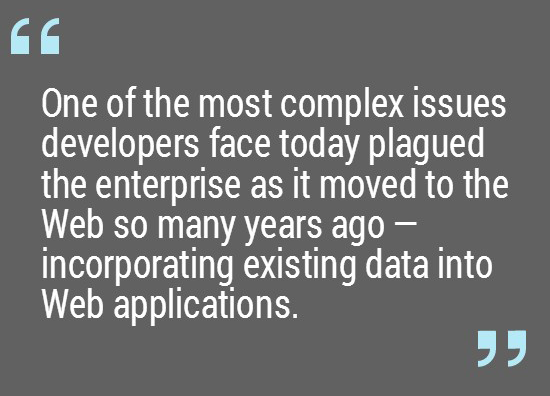Develop A Mobile Strategy Like It's 1999

Mobile is everywhere and with its necessary integration into all sides of business, developers face numerous obstacles when implementing a successful mobile strategy - from user experience to standards to adapting for different devices. But what if I told you that these challenges are inherently the same hurdles that the developer community faced 15 years ago during the advent of the World Wide Web?
When operating under the assumption that mobile today is where the Web was in 1999 - from both a boom and hype perspective, as well as an application development perspective - there are two integral questions that arise. What can the Web's evolution teach us about the future of mobile? And how can developers address these challenges?
Big system integrations
Similar to today's mobile innovators, B2C companies, like retailers, took the lead in Web innovation ahead of B2B enterprises who were slower to adopt. However, as they so often do, enterprises may have taken longer to adjust, develop, implement, and, of course, make the internal adjustments that would allow for a Web presence, but B2B not only caught up but surpassed the B2C market. That said, one of the most complex issues developers face today plagued the enterprise as it moved to the Web so many years ago - incorporating existing data into Web applications.

Fifteen years ago, these businesses addressed the integration issues by incorporating technologies such as Enterprise Service Buses (ESBs) to bring together the Java or C++ backend with HTML-based front ends. Today, developers are doing this in the cloud - with mobile backend services (MBaaS). This technology enables developers to plug in to large enterprise systems such as SAP or Oracle at a single point of entry that can then work with the multitude of devices in the market today. This is a much stronger alternative than developing mobile apps for every device and having multiple entry points to the backend, where security threats abound.
Standards, platforms, and preferences
Of course, the question of industry standards has been around since before mobile or even the Web. However, in the early days of Web development, many turf wars raged - Windows or Web, IE or Netscape, pure HTML or proprietary JavaScript (sound familiar?); stay within AOL's walled garden or branch out to the worlds of Internet Explorer or Netscape?
Again, these turf wars are alive and well due to the plethora of devices available today. Do we go native, Web, or hybrid? Do we develop for iOS and Apple's walled garden, or Android or both, what about Windows Phones and Blackberry? What about the emerging mobile Web-based phones like Mozilla's FireFoxOS or Amazon Fire?
While standards bodies are working to come together, just like with the Web, it is unlikely we will ever see a single standard for mobile development. Rather, developers will exercise the Web standards currently in place and will use technology that provides a "best of" scenario. Each has a place and benefits and I am of the belief that the development environment and process chosen should be based on app requirements and user experience. Technology should not dictate app creation and businesses should look to tools that can offer developers a choice.
Skillsets and proper planning
As was the case back in the '90s, enterprise developers struggled to transition their desktop skillsets to that of Web development. Change is difficult, as is learning new programming languages and deployment environments. This same class of developers, who either migrated their skillsets to the Web or moved on to greener pastures are once again faced with a monumental shift. Many are very comfortable building Web applications but are now forced to go mobile and need to acquire skills for mobile development. And trying to integrate those approaches and skillsets can be a challenge for both developers and enterprises, just like it was during the early stages of Web, when developers had to shift from using Visual Basic or C++ to the likes of HTML, .NET and JavaScript.
Even if a business has developers with the required know-how, setting forth a strategy is unlike anything they've experienced in the past. Historically, budgets were allotted to create and deploy an app. However, for those taking the leap into mobile, many have not anticipated factors such as the rapid pace in which mobile evolves, requiring multiple iterations of the same application throughout the year or when a new device enters the market. Let's face it: Within the next year or two, wearables are going to send many mobile app developers back to the drawing board.
Eventually, mobile, like the Web, is going to become something commoditized. So organizations need to prepare for this day. It is not simply going to be about integrating data in desktops, tablets and smartphones - it is about integrating data across smart technologies, wearables, kitchen appliances and more, making all of these disparate devices talk to each other and share information as quickly and easily as the market evolves.
There are numerous solutions available today that provide for cross-platform development and help developers to create apps in the environments in which they are comfortable. In the future, it is up to the business to determine their customers' needs and determine the proper approach for their organization. Taking an adaptive development approach enables developers and enterprises to develop once and deploy many times, as well as better prepare for whatever the next big wave of devices may be ... when history repeats itself again.
Stephen Forte is the chief strategy officer at Telerik and is the co-founder and executive director of AcceleratorHK, Hong Kong's first startup accelerator. He mentors at several startup accelerators, including Haxlr8r. Stephen is also a board member of the Scrum Alliance and has co-founded and held executive roles at many prominent companies including Triton Works (co-founded), Corzen, Inc. (co-founded), Zagat Survey (CTO) and The Aurora Development Group (co-founded).







